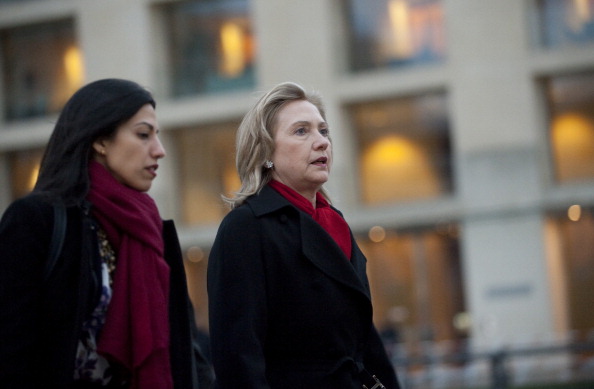
Senate Judiciary Committee Chairman Charles Grassley has put a hold on the nomination of a senior State Department diplomat over what he says is the agency’s two-year pattern of “bad faith” in his investigation of Hillary Clinton’s tenure there.
The latest example of that pattern, Grassley says, is the department’s failure to provide copies of thousands of e-mails allegedly sent or received by a top Clinton aide, Huma Abedin, involving the head of a private consulting firm for whom Abedin simultaneously worked in 2012.
Grassley filed a statement in the Congressional record Tuesday evening indicating that he would block the nomination of career foreign service officer David Malcolm Robinson, who has been tapped by Secretary of State John Kerry to be Assistant Secretary for Conflict and Stabilization Operations. Grassley said Robinson was “an innocent victim” of the State Department’s “contemptuous failures to respond to Congressional inquiries.” Grassley said the department “has engaged in unreasonable delay in responding to Judiciary Committee investigations and inquiries” including the Abedin issue.
Grassley’s office says the Senator was tipped by a confidential source to the existence of approximately 7,300 e-mails sent or received by Abedin involving Douglas Band, the head of a global consulting firm, Teneo Holdings, who served as President Bill Clinton’s personal aide for much of his presidency. Abedin had been Hillary Clinton’s deputy chief of staff and in June 2012 shifted jobs to become a “Special Government Employee” at the State Department while also being paid as a consultant by Teneo Holdings. Grassley requested documents relating to Abedin’s unusual employment arrangement in June 2013 and has yet to receive the e-mails, his office says.
Abedin’s employment by the State department and Teneo Holdings came after her maternity leave from the government, when she was living in New York with her husband, former Congressman Anthony Weiner. Abedin was given the unusual job designation, “Special Government Employee” which is normally reserved for employees being hired from the private sector or elsewhere in government with unique expertise.
In a July 2013 response to Grassley, the State Department said Abedin was retained as “a senior adviser/expert” under the SGE designation, which allowed her to serve other clients or entities and to keep her security clearance. In a July 5, 2013, letter from Abedin to the department included in its response to Grassley, Abedin said the birth of her son “led me to decide to spend the bulk of my time in New York City” and that she had received approval for the arrangement from the department’s legal staff and human resource officials.
Abedin’s lawyers said that while they, like Grassley, have not seen the emails involving Band, they suspect based on the volume of email and the wording in the Senator’s letter that they are mass mailings of schedules or press clips on which both Abedin and Band are copied. In her July 5 letter to the State Department, Abedin said she “provided strategic advice and consulting services to the firm’s management team, as well as helped organize a major annual firm event.” She said she wasn’t asked to undertake any work on Teneo’s behalf with the State Department, and didn’t provide “insights about the Department, my work with the Secretary, or any government information” to Teneo.
Band has built Teneo’s business around the network he established as President Bill Clinton’s personal aide at the White House and during his post-presidency. He has been the target of criticism from some Clinton allies for leveraging that network for personal advancement, most notably in a Sept. 2013 New Republic article. A spokesman for Teneo did not immediately return a messages requesting comment for this story.
The State Department has provided five letters since 2013 in response to Grassley’s inquiries about everything from its use of SGE designations to Clinton’s use of a private e-mail server. But Grassley says those letters have been incomplete and that the department has willfully withheld responsive materials, demonstrating “a lack of cooperation and bad faith in its interaction with Congress.”
Grassley says Abedin’s employment by both State and Teneo raise concerns about potential conflicts of interest. Abedin also worked for the Clinton Foundation during the period she was working for Teneo. Grassley has also alleged that Abedin may have improperly received payment from the department while on leave.
A State official says the Department will be providing a response to Grassley “in the very near future.”
More Must-Reads from TIME
- Donald Trump Is TIME's 2024 Person of the Year
- Why We Chose Trump as Person of the Year
- Is Intermittent Fasting Good or Bad for You?
- The 100 Must-Read Books of 2024
- The 20 Best Christmas TV Episodes
- Column: If Optimism Feels Ridiculous Now, Try Hope
- The Future of Climate Action Is Trade Policy
- Merle Bombardieri Is Helping People Make the Baby Decision
Contact us at letters@time.com